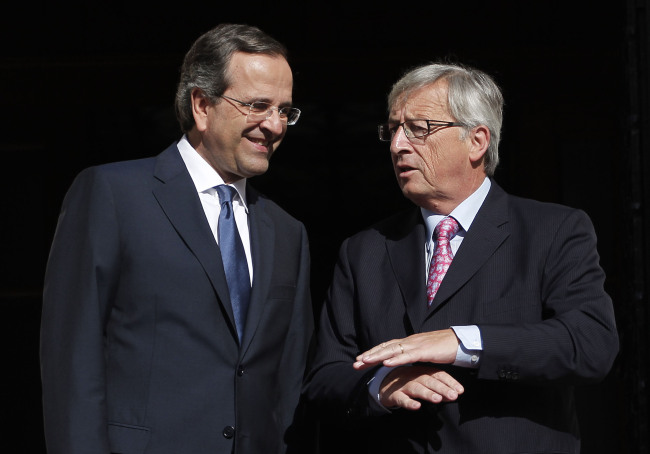Eurogroup chief Juncker ‘totally opposed’ to Greek eurozone exit
ATHENS (AFP) ― Eurogroup chief Jean-Claude Juncker insisted Wednesday that Greece’s place was in the eurozone but urged its government to redouble reform efforts to secure continued EU-IMF financial aid.
Juncker, head of the Eurogroup of eurozone finance ministers, said he was “totally opposed” to Greece being forced out of the 17-nation bloc, a move he said would create a “major risk” for the entire euro area.
But he noted that the struggling country had a “last chance” to get an economic recovery on track and restore its international credibility after falling behind with structural reforms and a crucial privatisation program.
“As far as the immediate future is concerned, the ball is in the Greek court. In fact this is the last chance and Greek citizens need to know this,” Juncker said after a two-hour meeting with Prime Minister Antonis Samaras.
Juncker added that in his opinion, the Greek government’s “priority number one is the consolidation of public finances, (along with) a robust and credible strategy for closing the mid term gap” in its debt-laden accounts.
 |
Greek Prime Minister Antonis Samaras (left) welcomes Luxembourg’s Prime Minister and Eurogroup Chairman Jean-Claude Juncker prior their meeting in Athens on Wendesday. (AP-Yonhap News) |
He called this a “precondition” for the release of further instalments from a 130-billion-euro ($161-billion) rescue package that Greece has been drawing from this year to ward off bankruptcy.
Following reported comments by Samaras that he needed “breathing space” to get Greece’s recession-hit economy going, and thus a longer deadline to meet conditions agreed with international creditors, Juncker said that would depend on a report to be drawn up by experts.
“As regards the lengthening of the adjustment period, it will depend on the findings of the troika mission,” Juncker said in reference to auditors from the European Union, European Central Bank and International Monetary Fund.
Samaras is starting a European tour to get his message across, travelling to Berlin on Friday to meet German Chancellor Angela Merkel, and to Paris on Saturday to see French President Francois Hollande.
Merkel and Juncker have already ruled out quick decisions however.
“We won’t have a solution on Friday,” Merkel said Wednesday during a visit to Moldova. “We will wait for the report of the troika. Then we will decide.”
Merkel and Hollande, leaders of the eurozone’s top two economies, are to meet in Berlin on Thursday, with Greece said to be high on their agenda.
“The aim is to discuss flexibility in return for assurances, and the two want to have a common line before the arrival of the Greek prime minister,” Claire Demesmay of the German Council on Foreign Relations, told AFP.
Juncker told RTL television in Luxembourg: “There will be no decision on Greece before the month of October,” as officials in Athens work to obtain a transfer of financial aid valued at 31.5 billion euros ($39 billion).
In an interview with the popular German daily Bild, Samaras said Wednesday Greece needed more time to make spending cuts and reforms that are a condition for the next tranche of the EU-IMF rescue package. “All we want is a little ‘breathing space’ to revive the economy quickly and raise state income,” Samaras told Bild.
“Let me be very clear. We are not asking for additional money. We are sticking by our commitments and are meeting all our requirements,” he underlined.
In an interview with German newspaper Sueddeutsche Zeitung he also vowed to repay the aid Greece has received to help keep it afloat and to deliver on its commitments.
Samaras admitted that much had gone wrong in Greece but said it was determined to change its ways and would fulfil its commitments for 11.5 billion euros ($14.2 billion) of savings.
“The Germans will get their money back, that I guarantee personally. And all the others will get their money back too. We will fulfil our commitments fully,” Samaras told the paper.
In a separate interview with the Bild newspaper, Samaras boldly said that Greece could bounce back in “spectacular” style.
“We could see the spectacular return” of Greece, he said, comparing the possibility to the nation’s unexpected victory in the Euro 2004 football tournament. “It was a miracle,” he said.
Quoting the former German coach of the Greek team then, Samaras said: “Otto Rehhagel said that the success was the result of a mix of typical German values, Greek enthusiasm and inventiveness.”
“Therefore we have the right recipe,” he said.
The finance ministry on Wednesday said state revenue was 2.8 billion euros below target in the first seven months of the year, mainly owing to delays in tax payments.
Greece is finalizing a program of spending cuts valued at about 11.5 billion euros for 2013 and 2014, a period that Samaras wants to extend by two years.
Most of the cuts are to come from salaries, pensions and benefits, and have caused friction within the conservative-led, three-party coalition government.
A Greek finance ministry source told AFP that an additional 2-2.5 billion euros in spending cuts “cannot be ruled out.”
Auditors sent by the EU, IMF and European Central Bank are expected here in September to report on progress in implementating the reforms.
In seeking a two-year reprieve, Samaras is likely to invoke a clause in the second bailout package that provides for an extension to the program in the event of a “deeper than expected recession.”
As Greece struggles with its fifth year of economic contraction, forecasts now are that its economy will shrink by 7.0 percent this year, much more than an initial estimate of 4.5 percent.








